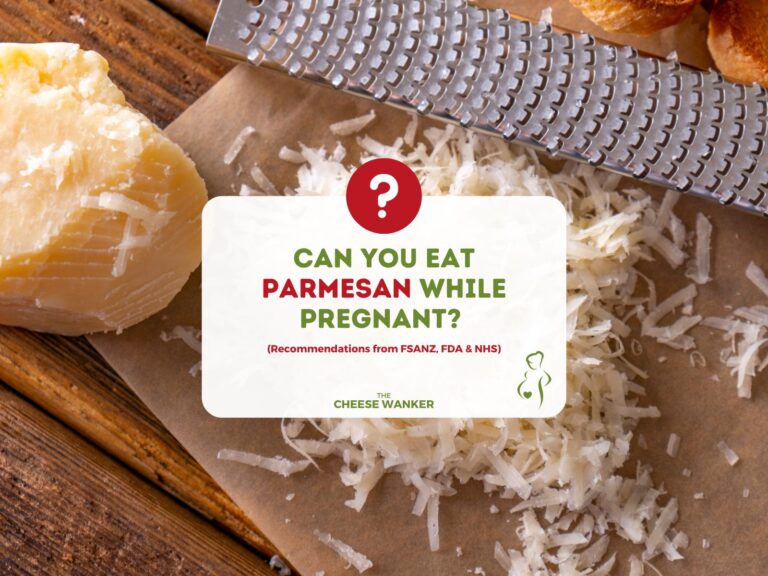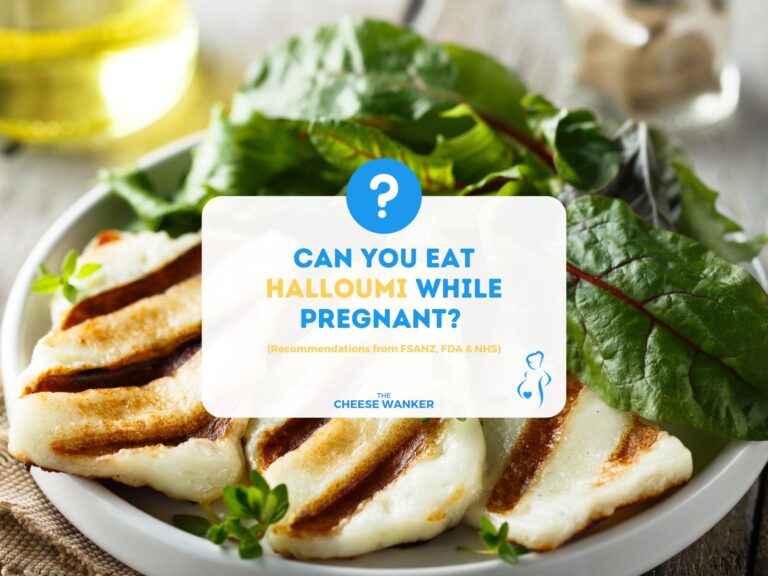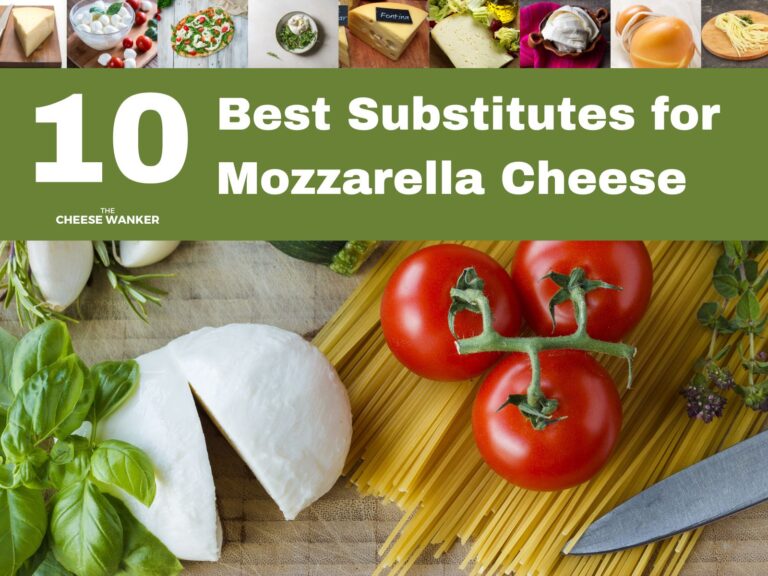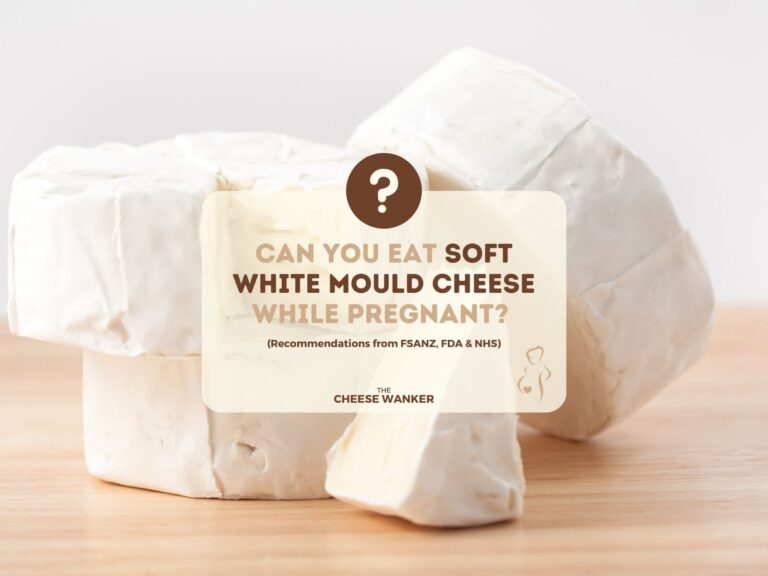Pregnancy brings a cascade of questions about what’s safe to eat. One such query revolves around the hugely popular cheese, Mozzarella. In this post, we unravel the mysteries, debunk myths and explore the science behind pregnancy nutrition and this Italian pasta filata cheese. Read on to find out whether you can safely eat Mozzarella during pregnancy.
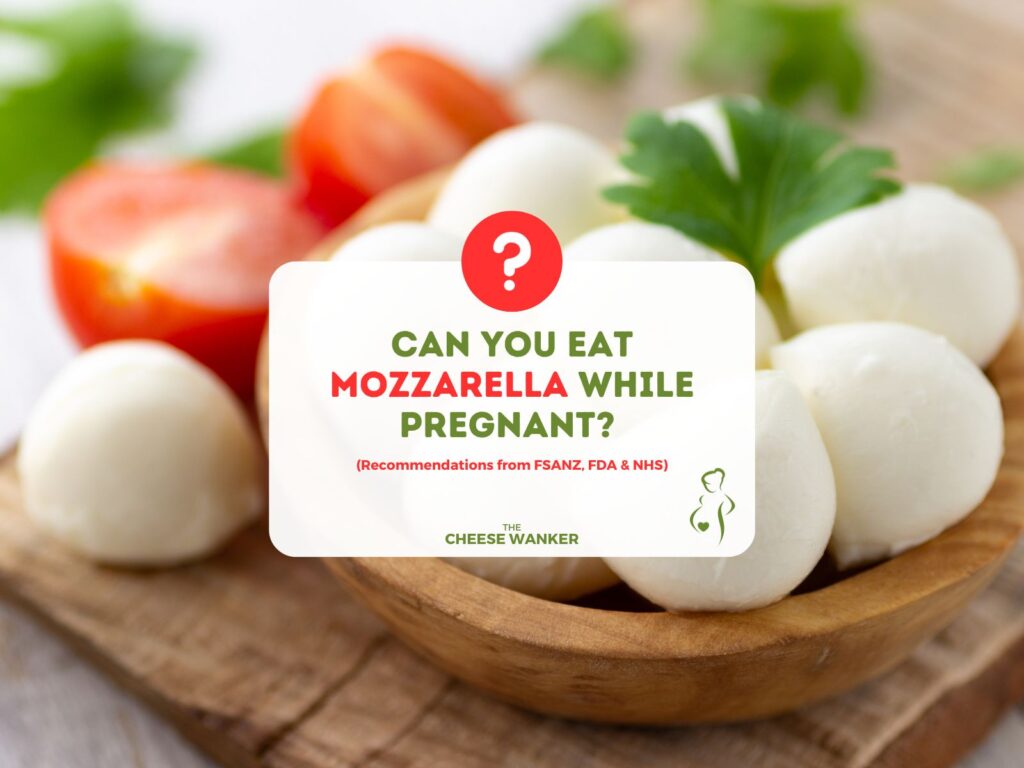
SEE ALSO: Our complete guide to which cheeses you can eat during pregnancy →
The basics of pregnancy nutrition
During pregnancy, maintaining a well-balanced and nutritious diet is paramount for the health and development of both the mother and the growing foetus. The right nutrients provide essential building blocks for the baby’s organs, bones and overall growth, while also supporting the mother’s changing body and energy needs.
You can read more about the specific dietary needs of a pregnant woman in this article here.
Why are unpasteurised dairy products risky in pregnancy?
Unpasteurised dairy products pose a risk during pregnancy due to the potential presence of harmful bacteria, particularly Listeria monocytogenes. Listeria is a bacterium that can cause a foodborne infection called listeriosis.
Pregnant women are at an increased risk of contracting listeriosis because pregnancy weakens the immune system, making it harder for the body to fight off infections.
Listeriosis can lead to serious complications during pregnancy, including miscarriage, stillbirth, premature birth or severe illness in newborns. Even if the pregnant woman herself experiences only mild symptoms, the infection can significantly impact the health of the developing foetus.
What is pasteurisation?
The pasteurisation process, which involves heating the dairy products to a specific temperature to kill harmful bacteria, effectively eliminates Listeria and other pathogens. Unpasteurised dairy products, on the other hand, have not undergone this heat treatment, making them a potential source of Listeria infection.
Having said that, this risk is often mitigated in aged cheeses. This is due to their lower moisture content and higher salt content which create an inhospitable environment for pathogens like Listeria monocytogenes.
What is Mozzarella cheese?
Mozzarella is a pasta filata cheese that traces its origins back to southern Italy. This soft and elastic cheese is traditionally made from the milk of water buffaloes or cows. Renowned for its smooth texture and ability to melt beautifully, Mozzarella has become a beloved ingredient in various culinary creations.
Its versatility extends beyond its traditional form, with smoked and shredded variations adding depth to a wide array of dishes. Whether enjoyed in its purest form or as a flavourful accent, Mozzarella stands as a testament to the artistry of Italian cheesemaking, making it a delightful addition to any gastronomic journey.
Is Mozzarella a pasteurised cheese?
While traditional Mozzarella was originally made with raw milk, many commercially available versions today are made using pasteurised milk to meet safety standards and regulations. In fact, this rings mostly true for those found in supermarkets and used in food service.
Can pregnant women safely eat Mozzarella?
When purchasing Mozzarella cheese, it is advisable to check the label or product information to determine whether it is pasteurised or not. Pasteurised Mozzarella is considered safe to eat, even for pregnant women, as the pasteurisation process eliminates the risk of pathogens.
However, if you are unsure about the pasteurisation status of the Mozzarella you encounter, it is best to err on the side of caution and avoid it. Moreover, both the FDA and FSANZ do not recommend the consumption of raw milk Mozzarella during pregnancy. Having said that, there is one exception to this, and we’ll get back to it a bit later.
Always read product labels, ask your retailer, or check with the manufacturer to confirm whether the Mozzarella cheese you are considering is pasteurised or not.
Is it safe to eat cooked raw milk Mozzarella?
This is where it gets really interesting. Thoroughly cooking any type of cheese until steaming hot will destroy any harmful pathogens that may be present in it. Indeed, most harmful bacteria like Listeria do not survive temperatures above 75°C/165°F.
What does all this mean? Well, if you are unsure whether the Mozzarella you’ve bought is made with raw or pasteurised milk, you can actually cook or grill it to render it safer.
Nutritional benefits of Mozzarella
Regardless of the version, fresh Mozzarella offers a range of nutritional benefits. Here are some key aspects to consider:
Rich in Protein
Mozzarella is an excellent source of high-quality protein, crucial for tissue repair, muscle development and overall growth. It provides a substantial protein boost without an excessive intake of saturated fats.
Calcium Content
As a dairy product, Mozzarella is abundant in calcium, a mineral essential for maintaining strong and healthy bones. Adequate calcium intake is particularly important during pregnancy and for promoting bone health throughout life.
Vitamins and Minerals
Furthermore, Mozzarella contains essential vitamins and minerals, including vitamin B12, which is vital for nerve function and the formation of red blood cells. Additionally, it provides phosphorus, necessary for bone health and selenium, an antioxidant that supports immune function.
Low in Carbohydrates
For those mindful of carbohydrate intake, Mozzarella offers a relatively low-carb option. This makes it suitable for various dietary preferences, including low-carb or ketogenic diets.
Conjugated Linoleic Acid (CLA)
Some studies suggest that Mozzarella, particularly cheese from grass-fed animals, may contain small amounts of conjugated linoleic acid (CLA). CLA has been associated with potential health benefits, including anti-inflammatory and antioxidant properties.
While Mozzarella can be a nutritious addition to a balanced diet, it’s important to consume it in moderation due to its calorie and fat content. Opting for part-skim or low-fat mozzarella varieties can be a wise choice for those aiming to manage their overall fat intake.
As with any food, considering individual dietary needs and preferences is key to incorporating Mozzarella into a health-conscious lifestyle.
You can find our comprehensive assessment of two different types of Mozzarella’s nutrition facts in this post here: Buffalo Mozzarella and Low Moisture Part Skim Mozzarella.
Pregnancy-friendly recipes using Mozzarella
Here are three pregnancy-friendly recipes using Mozzarella that are not only delicious but also packed with essential nutrients for expectant mothers:
Whole Wheat Margherita Pizza
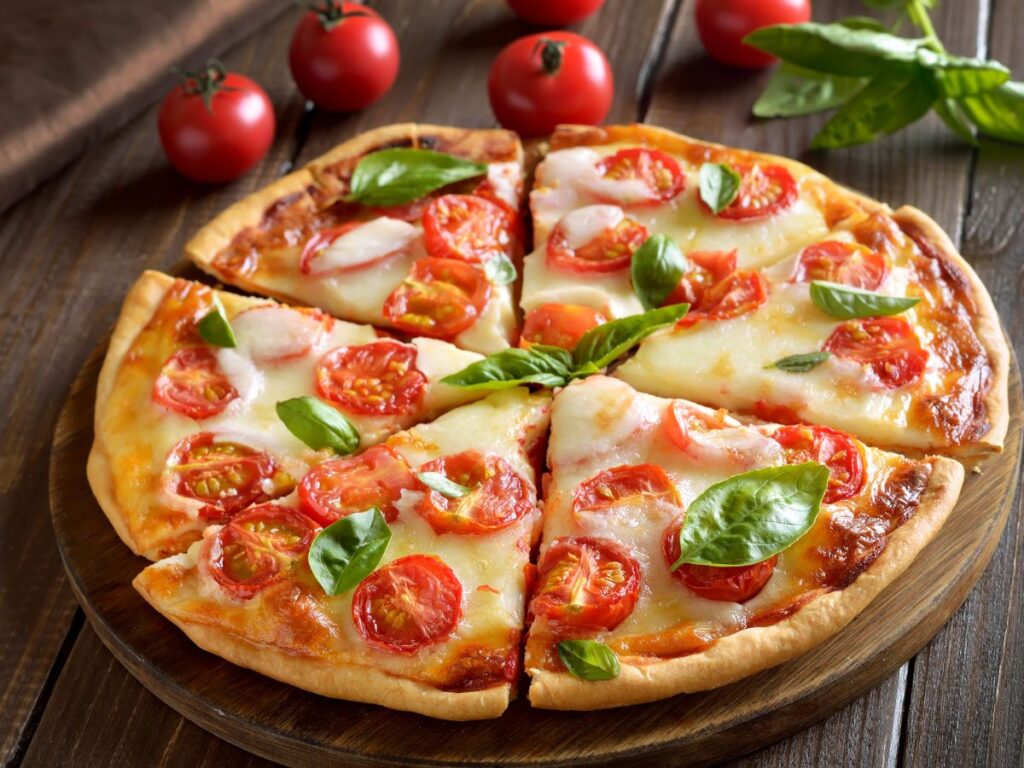
Satisfy your pizza cravings with a wholesome twist. Whole wheat crust is topped with tomato slices, fresh basil and low-moisture Mozzarella. Together, these ingredients offer a balance of carbohydrates and calcium for a pregnancy-friendly dinner.
Mozzarella and Pesto Salad
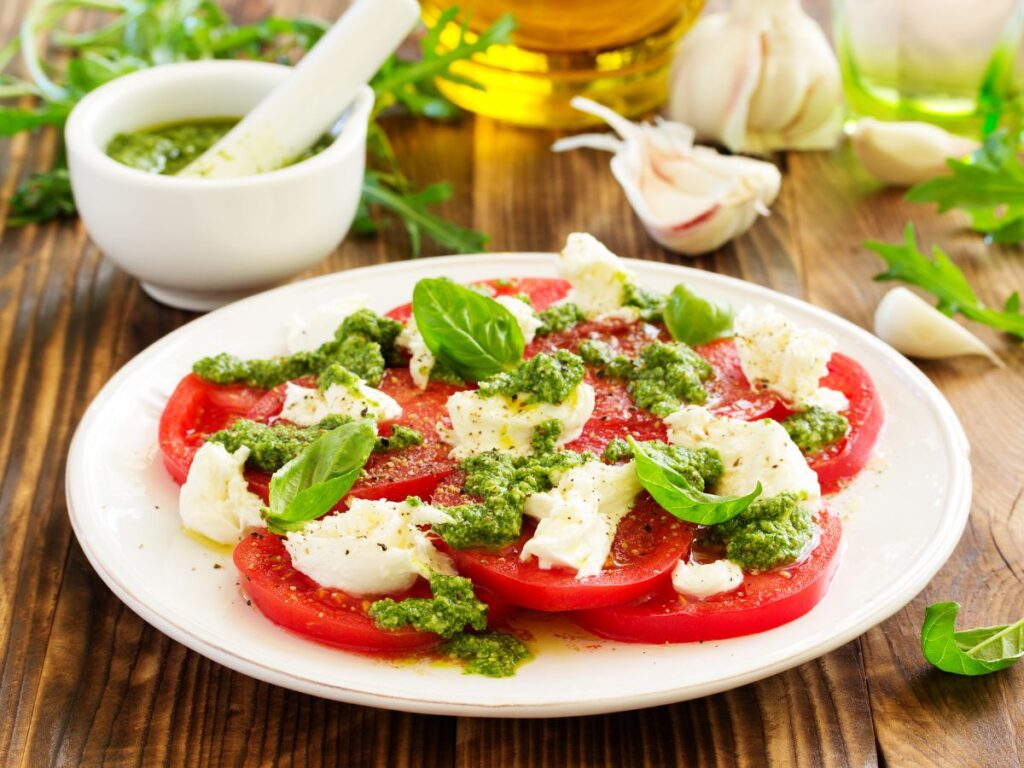
A vibrant salad combining shredded fresh pasteurised Mozzarella with cherry tomatoes, fresh basil and a drizzle of homemade pesto. This refreshing dish is a symphony of flavours, delivering a dose of healthy fats and vitamins, making it an ideal side or light lunch option for expectant mothers.
Tomato and Mozzarella Quinoa Salad
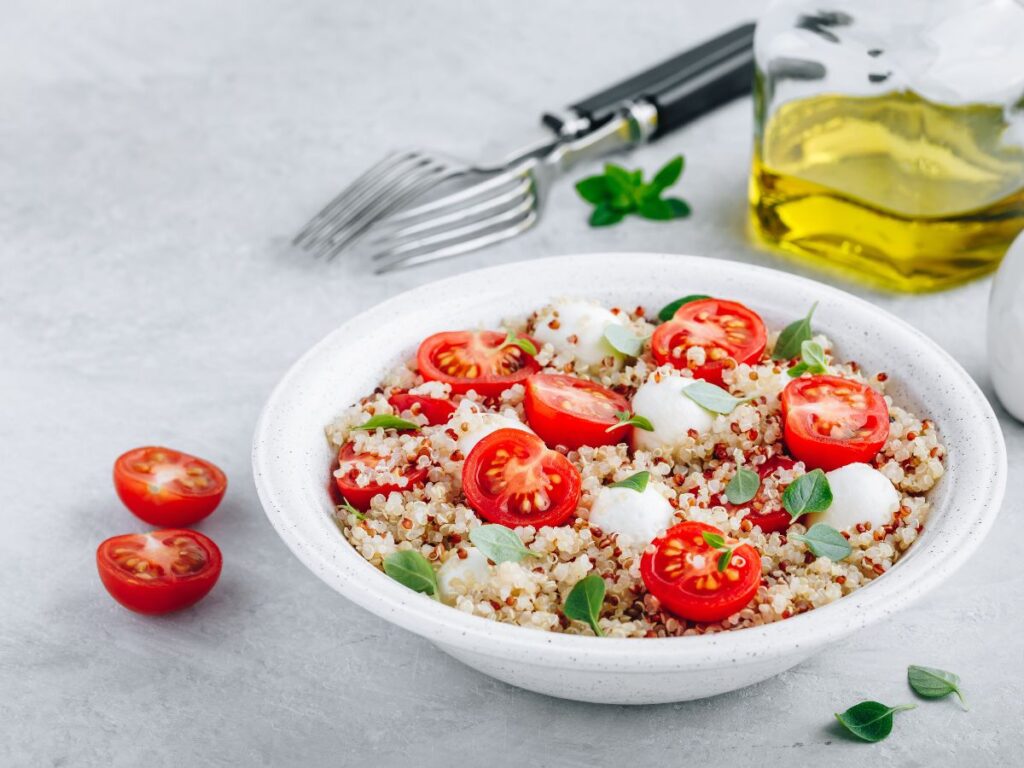
This refreshing salad combines cooked quinoa with juicy cherry tomatoes, small, pasteurised Mozzarella balls (Bocconcini) and a light vinaigrette. High in fibre and protein, it makes for a satisfying and nutritious lunch or side dish.
Conclusion
In conclusion, Mozzarella is a versatile and nutritious ally for expectant mothers, offering a symphony of flavours and essential nutrients. As you embark on this unique gastronomic journey during pregnancy, consider exploring the diverse recipes provided, incorporating Mozzarella into your meals with mindful choices.
Remember, moderation and variety are key elements in a healthy pregnancy diet. Whether you’re relishing a pasteurised Mozzarella and pesto salad or savouring the comfort of a Margherita pizza, let each bite contribute to the celebration of life.
To continue your exploration of pregnancy-friendly recipes and nutrition tips, stay tuned for more insights on our blog. Your journey into motherhood is unique, and we’re here to support you with valuable information and delicious culinary inspirations.
Cheers to a healthy and joyful pregnancy!
References
Safety in Pregnancy
All the advice relating to what cheeses you can eat during pregnancy in this article is based on the recommendations by health authorities in Australia, the UK and the USA. If you are unsure about what you can or cannot eat, please consult your doctor.
Australia – FSANZ, United Kingdom – NHS and United Sates of America – FDA
Nutritional content
The nutritional content of cheese in our table comes from the USDA Food Data Central Repository and cheese manufacturers. We realise that there can be variations between different brands and producers. Hence, the numbers we have used are averages.
Fat
Our fat RDI data comes from Cleveland Clinic’s Healthy Fat Intake resource.
Type of fat in cheese as per Harvard T.H. Chan’s The Nutrition Source.
Protein
Our protein RDI data comes from Harvard Medical School’s Harvard Health Publishing.
